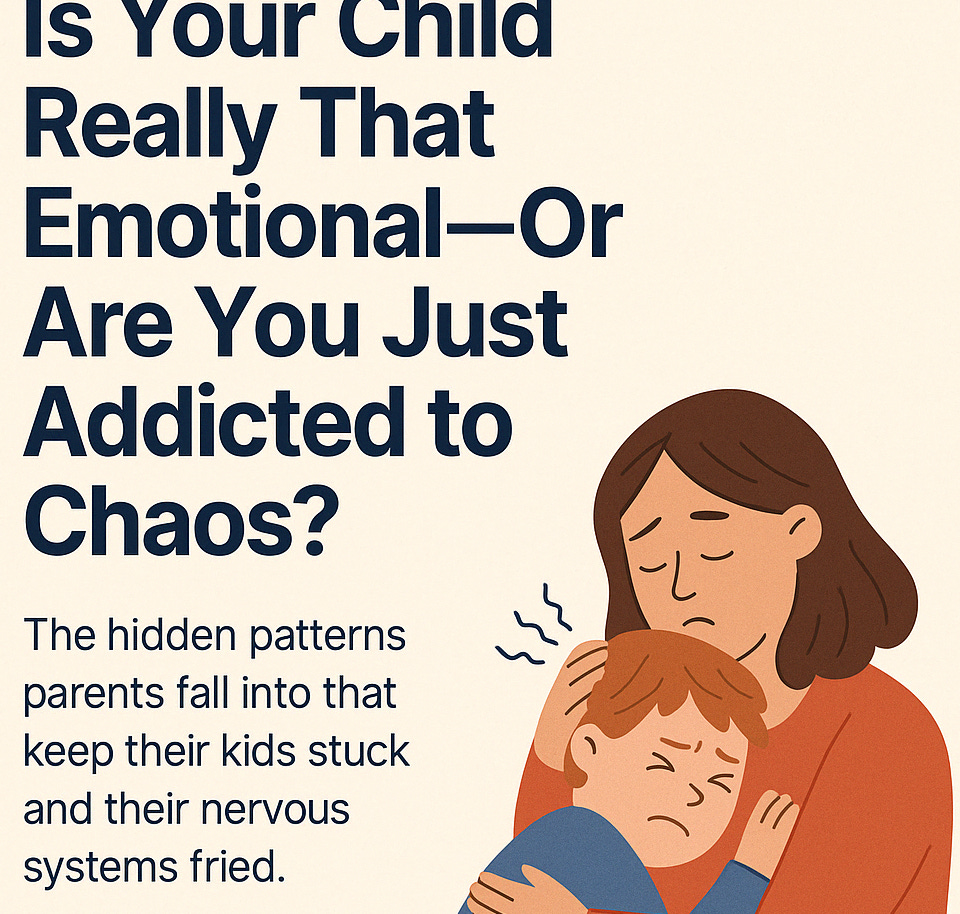Stop Emotionally Parenting for the Drama
How Emotional Munchausen’s by Proxy Is Quietly Wrecking Your Connection With Your Kid
Let’s talk about a hard-to-swallow truth:
Some parents aren’t just surviving the chaos.
They’re unconsciously creating it—because it gives them something to do, someone to be, or a story to tell.
If that stings, good. That means you care.
What This Looks Like (You’ve Seen It Before)
The parent who escalates minor conflicts into full-blown meltdowns.
The one who constantly rehashes how “hard” their kid is—on social media, in therapy, with other parents.
The parent who over-accommodates and rescues their child, then complains about burnout.
The one who seems oddly proud of how emotionally “complex” their household is.
The angry, controlling parent who loses it when their child doesn’t comply—and uses the emotional chaos that follows to justify their own emotional volatility or to gain sympathy and support from others.
Some parents unintentionally reinforce their child’s dysregulation in order to gain sympathy, control the household narrative, or avoid other uncomfortable truths in the family dynamic.
Sound harsh? Maybe.
But if you’re deep in family systems work, you see it all the time.
The Hidden Payoff: Purpose, Control, and Identity
Let’s get brutally honest here:
Some parents find a sense of purpose in constantly fixing emotional fires.
Others use the drama to unconsciously avoid their marriage, their own trauma, or their lack of self-worth.
Some may even use the dysfunction as leverage—securing flexibility from work, drawing sympathy from others, or justifying why their life feels out of control.
Sometimes this starts subtly—feeling important when your kid needs you, or validated when you can explain why your household is so hard. But left unchecked, that small hit of purpose can quietly grow into a pattern of emotional dependency.
And yes, in rare cases, there’s even a financial motive:
One parent fixates on a child’s emotional regulation while the other leans on the narrative to get financial support from family. Grandma and Grandpa foot the bill under the guise of “helping the child”—while the stay-at-home parent gets to fully “attune and attach.” I shit you not—I’ve had a case like this.
More gentle parenting bullshit in disguise.
Not all emotional pain is purely authentic and unmotivated.
Let’s be real—dysfunction almost always pays off in some way.
Because misery doesn’t just love company—it creates a hierarchy.
Whoever struggles the most gets the most attention, flexibility, and emotional power in the household.
Most of the Time, It’s Not Malicious—It’s Ancestral
Let’s not vilify parents here. Most aren’t trying to manipulate their kids.
They’re re-enacting patterns from their own upbringing:
Maybe they were the emotional caretaker for their own parents.
Maybe they were neglected, and now feel valuable only when needed.
Maybe they were emotionally invisible growing up, and this chaos makes them finally feel seen.
So they unconsciously create emotional volatility to feel connected, relevant, or validated.
They enable, overreact, or over-identify—not because they’re bad people, but because their nervous system is wired to find safety in the familiar... even when the familiar is chaos.
Signs You’re Slipping into Emotional Munchausen’s
You feel most connected to your child when they’re struggling.
You over-share about their emotional issues as part of your identity.
You get defensive when someone suggests your child is doing better.
You feel uncomfortable or irrelevant when things are calm.
You jump in to rescue or escalate before the child has a chance to self-regulate.
You react with disproportionate anger when your child doesn’t comply—then use the fallout as a justification for your frustration or to get external support.
You find yourself uncomfortable when things are going well—like peace is boring or unsafe.
If any of these hit too close, that’s not shame. That’s awareness.
What to Do Instead: Redefine Connection and Purpose
If you’re a parent who’s fallen into this trap, the answer isn’t guilt—it’s redirection.
Ask yourself:
What role am I playing in this pattern?
What might this chaos be distracting me from?
(e.g., unresolved marital conflict, lack of identity outside of parenting, unprocessed trauma, or dissatisfaction with work/life balance)What would it look like to connect with my child through calm, not chaos?
What deeper need am I trying to meet through their struggles?
Where else can I find purpose, identity, or emotional meaning?
Then start building rituals of connection that aren’t based on crisis:
Daily check-ins that don’t revolve around problems.
Shared hobbies or playful routines.
Time spent together without a “fix it” agenda.
Final Thought: Stop Rescuing. Start Reflecting.
Your child is not your emotional lifeboat.
They are not your mirror, your redemption arc, or your second chance to rewrite your own childhood.
They are their own person.
And the most powerful parenting shift you can make is this:
Let them be regulated, even if it means you have to sit with the silence of your own discomfort.
That silence you feel when things are calm?
That’s not emptiness. That’s your nervous system detoxing from chaos.
Sit in it long enough… and you’ll finally hear what your child’s actually trying to become.
If this hit home and you’re ready to dig deeper into emotional patterns, parenting identity, and family dynamics that actually create connection—join the premium series:
👉 Breaking the Unconscious Chains of Your Family System
💬 Let’s talk: Have you ever noticed this pattern in your parenting—or someone close to you? Drop a comment and let’s open this up.
📤 Know someone who needs this? Forward it to the group chat. Or that friend who says “My kid is just sensitive” right before their kid wrecks an Apple store.




"That silence you feel when things are calm?
That’s not emptiness. That’s your nervous system detoxing from chaos.
Sit in it long enough… and you’ll finally hear what your child’s actually trying to become." This piece makes so much sense ~ loved it!